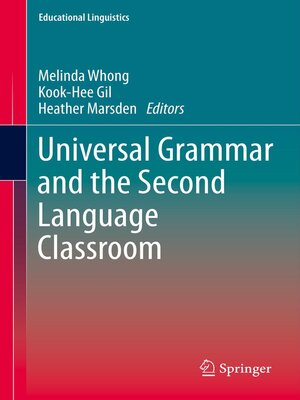Universal Grammar and the Second Language Classroom
ebook ∣ Educational Linguistics
By Melinda Whong

Sign up to save your library
With an OverDrive account, you can save your favorite libraries for at-a-glance information about availability. Find out more about OverDrive accounts.
Find this title in Libby, the library reading app by OverDrive.



Search for a digital library with this title
Title found at these libraries:
| Library Name | Distance |
|---|---|
| Loading... |
This book proposes that research into generative second language acquisition (GenSLA) can be applied to the language classroom. Assuming that Universal Grammar plays a role in second language development, it explores generalisations from GenSLA research. The book aims to build bridges between the fields of generative second language acquisition, applied linguistics, and language teaching; and it shows how GenSLA is poised to engage with researchers of second language learning outside the generative paradigm. Each chapter of Universal Grammar and the Second Language Classroom showcases ways in which GenSLA research can inform language pedagogy. Some chapters include classroom research that tests the effectiveness of teaching particular linguistic phenomena. Others review existing research findings, discussing how these findings are useful for language pedagogy. All chapters show how generative linguistics can enhance teachers' expertise in language and second language development. "This groundbreaking volume ably takes on the gap that currently exists between generative linguistic theory in second language acquisition (GenSLA) and second language pedagogy, by gathering chapters from GenSLA researchers who are interested in the relevance and potential application of their research to second/foreign language teaching. It offers a welcome and thought-provoking contribution to any discussion of the relation between linguistic theory and practice. I recommend it not only for language teachers interested in deepening their understanding of the formal properties of the languages they teach, but also for linguists interested in following up on more practical consequences of the fruits of their theoretical and empirical research." Donna Lardiere, Georgetown University, Washington DC, USA







